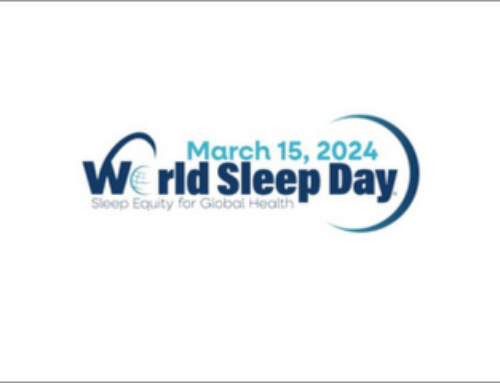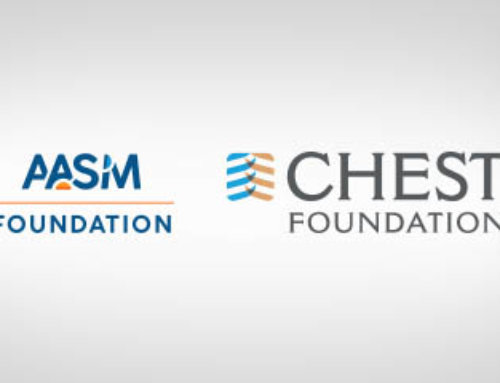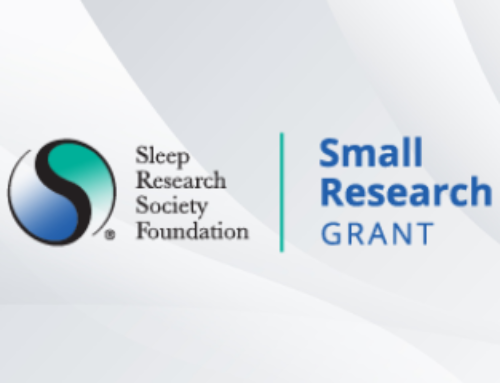Heart disease is the #1 leading cause of death in the United States. Recently, the American Heart Association added sleep as part of Life’s Essential 8TM , which includes key measures for improving and maintaining cardiovascular health. Sleep disorders have been shown to be a risk factor for cardiovascular diseases.
Over the years, the AASM Foundation has funded various projects focused on sleep and its impacts on cardiovascular health. As part of American Heart Month, we’re highlighting the work of the researchers and projects we’ve supported that are leading the way in characterizing the risk associated with abnormal sleep duration, impact of sleep timing and quality on cardiometabolic outcomes, and potential solutions to positively influence the care and healthcare policy for individuals with sleep disorders and cardiovascular disease (CVD).
Impact of High PAP Adherence on Cardiovascular Outcomes Among Medicare Beneficiaries with Obstructive Sleep Apnea, 2006-2015

2018 Strategic Research Grant
Jennifer S. Albrecht, PhD
Goals: This project seeks to evaluate the potential benefit of positive airway pressure (PAP) therapy on cardiovascular (CV) outcomes among patients who have high PAP adherence. The data source for this project was a nationally representative sample of Medicare beneficiaries from the Centers for Medicare and Medicaid Services Chronic Conditions Warehouse from 2006-2015.
Results: This project is ongoing, but preliminary results show that CPAP adherence is associated with reduced risk for CVD events, stroke, and reduced inpatient utilization. Learn more about these project results in these articles: 2021 Sleep Breathing Physiology and Disorders, 2021 Journal of Clinical Sleep Medicine, and 2022 Journal of Clinical Sleep Medicine.
Significance: Many stakeholders are skeptical about whether PAP therapy benefits CV outcomes. This study has the potential to influence patient, provider, and public opinion regarding the potential benefits of PAP, which will help ensure millions of untreated patients receive the sleep health care they need.
Leveraging Polysomnographic Physiological Signals for Improved Cardiovascular Risk Stratification in Obstructive Sleep Apnea

2018 Strategic Research Grant
Diego Mazzotti, PhD
Goals: This project looked at different physiological signals that are commonly measured in a sleep study to understand their relative contribution in predicting cardiovascular diseases in the Sleep Heart Health Study. The research team is using existing polysomnography (PSG) data to expand current knowledge of CV pathophysiology in obstructive sleep apnea (OSA) and bridging the gap between PSG characteristics and clinical care by exploring signal-processing techniques and cutting-edge supervised and unsupervised machine learning method.
Results: The research team found that novel physiological information did not improve cardiovascular risk prediction when compared to conventional cardiovascular risk factors. However, data showed that OSA symptom subtypes are associated with cardiovascular risk, providing important evidence of their clinical relevance. Read this 2021 American Journal of Respiratory and Critical Medicine article to learn more about these results.
Significance: This project contributed to better understanding why some people with OSA are at increased cardiovascular risk, specifically those with moderate and severe disease. While using a comprehensive set of physiological markers did not improve cardiovascular risk prediction, the project highlighted potentially novel physiological biomarkers that deserve future investigation.
Cardiorespiratory Interactions during Noninvasive Ventilation

2018 American Board of Sleep Medicine Junior Faculty Grant
Salma Patel, MD, MPH
Goals: Markers of delayed ventricular repolarization are associated with ventricular arrhythmias, sudden cardiac death, and all-cause mortality. It is unknown whether OSA-related QT interval (QTc) changes are responsible for mediating the relationship between QTc and death. This project includes a retrospective analysis of existing sleep study databases to review baseline QTc intervals in patients with OSA with and without heart disease and evaluate the impact of apneas/hypopneas and all modes of noninvasive ventilation on QTc interval and mortality.
Results: This project is ongoing, but preliminary results show that sleep-disordered breathing (SBD) was associated with some measures of ventricular repolarization. However, sleep-disordered breathing was not a modifier for the relationship between QTc and QT variability and mortality. Read this 2022 Sleep Medicine article to learn more about these results.
Significance: This project has the potential to lead to a meaningful understanding of cardiorespiratory interactions in SDB. Markers of delayed ventricular repolarization, such as the QTc interval
obtained via electrocardiogram, are associated arrhythmias, sudden cardiac death, and overall mortality. QTc prolongation is noted during apnea and with aggressive ventilation. It is, therefore, plausible to think that QTc prolongation in these scenarios are associated with poor patient outcomes such as death.
Markers of Early Atherosclerotic Progression in Insomnia

2018 Strategic Research Grant
Megan Petrov, PhD
Goals: The identification of early markers of subclinical CVD in diagnosed insomnia is understudied, where few studies have used state-of-the-art technology to measure compromised vascular function and structure in diagnosed insomnia compared to rigorously-defined good-sleeping controls. The goal of this project was to compare markers of cardiovascular structure and function indicative of subclinical CVD between adults with insomnia and good-sleeping controls.
Results: The research team found that, among relatively healthy young adults, there were significant cardiac differences between individuals with insomnia disorder relative to good sleeping controls, but not in arterial structure or function. Individuals with insomnia disorder demonstrated subclinically worse left ventricular systolic and diastolic function of the heart. Read this 2020 SLEEP abstract to learn more about these project results.
Significance: Insomnia, a chronic disorder experienced by 10-22% of the adult population, may be a highly modifiable risk factor for cardiovascular disease. This project laid the foundation for future studies to test a comprehensive set of markers of compromised vasculature that are both highly predictive of CVD events and responsive to treatment.
Impact of Treated and Untreated Obstructive Sleep Apnea on 30-day Hospital Readmission among Medicare Beneficiaries with Pre-existing Cardiovascular Disease

2021 Diversity Supplement Grant
Doyinsola Bailey, PhD
Goals: This project will evaluate the impact of high CPAP adherence on risk of CV events and ischemic stroke events, and healthcare utilization among Medicare beneficiaries with newly diagnosed OSA.
Results: This project is ongoing, but preliminary results have shown that high CPAP adherence was associated with lower odds of 30-day hospital readmission, which highlights the importance of screening for and treating OSA among individuals with CVD. Read this 2022 Journal of Clinical Sleep Medicine article to learn more about these results.
Significance: This project could influence opinions regarding the potential benefits of PAP and its impact on hospitalization and 30-day readmissions, particularly among older adults with OSA and pre-existing CVD.
Investigating Sleep Duration and Vascular Inflammation in Patients with Sleep Apnea using Multi-Modality Imaging: Hybrid Positron Emission Tomography/Magnetic Resonance Imaging

2019 Physician Scientist Training Grant
Vaishnavi Kundel, MD
Goals: This project is investigating the independent influence of objectively measured habitual sleep duration (via actigraphy) on subclinical atherosclerosis in a population of individuals with sleep apnea (SA) and the effect of short sleep duration on vascular inflammation after short-term SA treatment.
Results: The research team found that prevalence of vascular inflammation was higher among those who had a short sleep duration of 6 hours or less. Additionally, OSA was associated with lower coronary artery calcium density. These findings show that derangements in visceral adipose tissue metabolic activity may play a role in adverse cardiometabolic outcomes and could be one of the key drivers of CV risk in OSA. Learn more about these project results in these articles: 2021 Journal of Clinical Sleep Medicine, 2021 Journal of Clinical Sleep Medicine, and 2021 Nature and Science of Sleep.
Significance: Using multi-modality imaging to differentiate between inflammatory and structural endpoints for atherosclerosis may provide novel insights into understanding how sleep impacts vascular health on a variety of fronts.
The AASM Foundation is the philanthropic arm of the American Academy of Sleep Medicine (AASM). The AASM has a wealth of free resources on sleep and heart health for providers, patients and the public to use:
- AASM Sleep Education – Heart Disease
- AASM Sleep Education – Sleep Apnea Hurts HEARTS
- AASM Talking Sleep Podcast – Obstructive Sleep Apnea and Cardiovascular Disease
The AASM is also committed to raising the standard of care for cardiology patients, many of whom are at high risk for obstructive sleep apnea and may need treatment for OSA prior to, or after, a cardiovascular procedure. Cardiology practices that have or want to implement a structured, multi-disciplinary approach to addressing sleep and heart health can apply for Specialty Practice accreditation, demonstrating a dedication to improving both patient outcomes and the continuity and efficiency of care. Learn more about Specialty Practice accreditation here.
For 25 years, the AASM Foundation has been Championing a Bright Future in Sleep Health. Make a donation today to honor our achievements in awarding $25 million of grants over the past 25 years.





